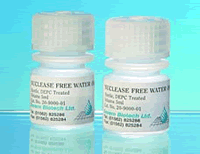PIPETTES & PCR
There are various types of PCR methods and techniques PCR (Polymerase Chain Reaction) by its very nature means that precautions need taking at all levels of work.
Our page on pipette cleaning provides a good insight into the best methods for cleaning a pipette to avoid contamination.
We have dedicated this page, however to prevention and although this is not strictly relate to pipette calibration it will provide some extra security for the integrity of test results.
Sample Contamination is the main problem with the
PCR reaction, whether this is standard PCR, Real Time
PCR, or Reverse Transcriptase PCR (rtpcr) the
issues and methods to avoid incorrect sequencing is the same.

![]()
Maintain separate sets of glassware, plastic ware, reagents, electrophoresis
equipment, pipettes, etc
Use small aliquots of solutions
- Clean equipment regularly
- Handle chemicals with disposable and "Clean" spatulas/spoons.
-Remove Rnase's from glassware by baking or soak in
DEPC (water or ethanol) and autoclave .
-Use "Clean" tips and tubes.
-Use "Clean" forceps to transfer items from
rack to racks, or tube to tube.
-Use new gloves from a clean box at all times.
-Don't touch work surfaces or extraneous equipment.
-When pipetting use sterile and "Clean Filter tips
-Use micro-volume pipettes with filter tip cones
-Use Rnase Free Water
If your test results do not appear as expected, then contamination
may well be the culprit. We suggest you check all elements
of the procedure including any electrophoresis steps
as well.
![]()

